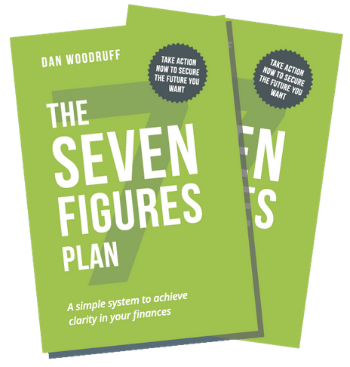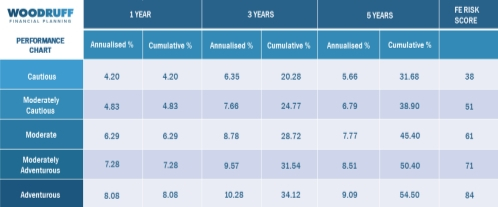Property vs Investment Portfolios - Which is Better?
We are often asked which is better – property or investment portfolios. This article examines all the issues, advantages and disadvantages of both property and investment portfolios.
Key points
- Investment returns
- Risk
- Costs
- Income
- Tax
- Flexibility, liquidity and access
- Diversification
- Complexity and hassle
- Consumer protection
A note of caution
Investments should only be made once you have the right level of experience, or have taken suitable professional advice. Please remember that this site is designed to give you informed information, but is not a substitute for personalised advice. Any investment involves risk to your capital, and therefore your investment can go down in value as well as up.
Investment returns
Investment returns are important. After all this is probably the main reason that you are comparing property investment and investment portfolios. If you believe the newspapers, property prices only ever seem to rise. While this is generally the case, property prices can also fall. To give you an idea of historical comparisons between the returns on property vs investment portfolios we have compared the average returns over various periods for the Halifax UK Property Index vs the Average UK Equity investment fund vs the UK Consumer Prices Index, which is the Government’s preferred measure of inflation. Naturally you want to ensure that your chosen investment can beat inflation. These indexes measure the average return; bear in mind that your chosen property or investment portfolio may not match this average in terms of returns or risk. However, these indexes give you some indication of what has taken place in the past. For each time period, we have shown an investment of £100,000, and the value as of 2nd September 2015. All investments shift in value, so these charts would all be different had we used alternative dates.
UK Property vs UK shares since the start of data
Since the start of the data an investment in UK shares would have generated a much bigger return on average than in UK property. An investment of £100,000 in UK shares would now be worth £662,756, which is £365,756 or 123% more than in UK property.
UK Property vs UK shares over 20 years
Over 20 years the figures look closer, but UK shares still beats property. An investment of £100,000 in UK shares would now be worth £390681, which is £59,971 or 18% more than in UK property.
UK Property vs UK shares over 15 years
Over 15 years, property comes out on top. An investment of £100,000 in UK shares would now be worth £176,135, which is £61565 or 26% less than in UK property.
UK Property vs UK shares over 10 years
Over 10 years, UK shares are again out-performing UK property. Interestingly, UK property has performed worse than UK inflation over this period, which means that you would have lost money in real terms had you invested in property on this date. An investment of £100,000 in UK shares would now be worth £180550, which is £59,488 or 49% more than in UK property.
UK Property vs UK shares over 5 years
Over 5 years, UK shares have performed much better than property investment. An investment of £100,000 in UK shares would now be worth £153,833, which is £33,624 or 30% more than in UK property.
Table of data showing annualised returns for UK Property vs UK shares
 This table shows the annual percentage growth rates of the various indexes over the periods shown. This shows that UK shares beat UK property as an investment over 3 years, 5 years and 10 years. The only period that UK shares was worse off than property was over the last year.
This table shows the annual percentage growth rates of the various indexes over the periods shown. This shows that UK shares beat UK property as an investment over 3 years, 5 years and 10 years. The only period that UK shares was worse off than property was over the last year.
Investment returns – which is better?
The data tends to support the fact that UK share investments outperform UK property (on average). This does depend on when you invest. For example, the shares data is better over all periods shown except 1 year and 15 years. Naturally, there will be ups and downs with investments, and periods when one type of investment performs better than another. However, we can see from this data that you should generally (but not always) expect UK shares to outperform UK property over time (although this is not guaranteed).
Risk
The issue of risk is closely linked to returns, since generally the more risk you take, the greater returns you should expect (on average, over time). As a result, if you take less risk, you should also expect lower returns. Therefore, it is important to think about how much risk you are prepared to take, and how much risk the type of investment actually takes. The charts below show how much risk an investment in property takes compared to an investment in UK shares.
Risk vs reward (volatility vs returns)
In general, the greater risks you are prepared to take, the greater returns you should expect, on average, over time. Shares investments are more volatile, and generally returns more over time, than property investments. Therefore, we can say that while the shares are riskier than property, the returns were also greater.
Borrowing (gearing)
One of the major advantages of property investment is that you can borrow to purchase your asset. This is called gearing. In theory, it is a perfect way to build your investments. Put down a deposit of 25% on a property, and take a mortgage on the remaining 75%. What is better, you can get someone else (the tenant) to pay the interest on the loan, along with any associated costs, leaving you with a potential profit and an appreciating asset. This is great when it works in your favour, as illustrated by the figures below: Positive gearing Sarah buys an investment property for £100,000, putting down £25,000 as a deposit, with a £75,000 interest only mortgage. The property goes up in value by 10%. The mortgage remains at £75,000, but the property is now worth £110,000. Sarah’s investment of £25,000 is now worth £35,000, which is an increase of 40%. In this case, a 10% market improvement means an increase in Sarah’s capital of 40%. Gearing has worked in Sarah’s favour. Negative gearing John buys an investment property for £100,000, putting down £25,000 as a deposit, with a £75,000 interest only mortgage. The property goes down in value by 10%. The mortgage remains at £75,000, but the property is now worth £90,000. John’s investment of £25,000 is now worth £15,000, which is a reduction of 40%. In this case, a 10% market loss means a decrease in John’s capital of 40%. Gearing has worked against John. What this shows is that if you use a mortgage to buy a property you increase the risk massively. Loss of a tenant While your mortgage is being repaid by a tenant, buy to let works in your favour. Just remember that you will still be liable for the loan even if you lose your tenant, or they cannot pay their rent. This is a risk that you should not overlook, and you should be sure that you can pay the loans even without a tenant. Increase in interest rates An increase in interest rates from the Bank of England or your lender can mean that your interest payments cost you more than your rental income. Make sure you understand how your profits would be affected in this event, especially as we expect interest rates to rise in a near future.
Risk – which is better?
This section does not produce an outright winner. The important thing to take from it is that property investment is generally less volatile, and therefore less risky than investments in shares. However, you should also expect lower returns as a result. Think about the level of returns you expect or need, and how much risk you are prepared to take. Also remember, that property does tend to concentrate risk (see the section below on Diversification) – you are more likely to put all of your eggs in one basket. Importantly, you can use an investment portfolio with various investment types to match the level of risk you are prepared to take. This is usually much less risky than investing solely in shares. Don’t forget that if you use a mortgage to buy an investment property, this increases the risk of your investment massively. You should also think carefully about the risks of interest rate rises or the loss of a tenant.
Costs
The data on returns ignore all of the costs associated with each type of investment. These costs can be varied and complicated.
The important thing to consider is the fact that the costs of investing will reduce the returns you make. So think carefully about this issue.
Property costs
Research tends to show that landlords underestimate the costs of renting a property. Here are some of the costs you need to consider, and factor in to your calculations.
- Solicitor’s fees
- Stamp duty – see our article on the 3% buy to let stamp duty tax increase
- Survey fees
- Letting agent’s management fees
- Letting agent’s fees for finding tenants
- Repair costs
- Refurbishment
- EPC checks mean that rental properties must have an energy rating of E of better by April 2018
- Carbon monoxide check must be carried out from October 2015
- Legionella responsibility
- Immigrant checks – this is due to be passed to landlords
- Exterior maintenance
- Cleaning
- Service charges
- Void periods – the lost rent when you are between tenants
- Income tax (see Tax below)
- Capital gains tax (see Tax below)
- Landlord’s insurance
- Mortgage fees
- Mortgage interest
- Dealing with property damage
- Compliance costs – gas and electrical safety certificates, CO and smoke detectors
- Legal costs when dealing with bad tenants and rent arrears
Of course, depending on your situation, you may not incur many of these fees. However, you should be careful not to underestimate the real costs of being a landlord.
Investment portfolio costs
With investment portfolios, the costs depend on the type of investments you select. Again, it can be easy to underestimate the annual costs, especially if these fees are expressed in different ways. Typical fees include:
- Initial charges
- Annual management charges
- Dealing costs
- Performance fees
- Exit charges
- Investment wrapper charges
- Investment platform charges
- Adviser charges
- Income tax (see Tax below)
- Capital gains tax (see Tax below)
More information on investment charges.
Cost – which is better?
Generally, the costs of investing in investment portfolios tends to be lower, although this does vary. This is because the market for investments is so much wider. You should take the time to investigate costs and charges fully before you commit to any investment.
Income
Another key reason for making any investment may be to produce an income. Investments are a popular way to add to your income, especially in retirement.
Property income
This is one of the main advantages of property investment. Usually (if you get a decent tenant), you can expect a stable and increasing income on a regular basis. This is great if you are looking for some passive income or are retired. Just remember that property income is not guaranteed, and you can experience rent arrears or void periods between tenancies.
You should also think about the income compared to the value of the property. This gives you the gross yield, and is a way to compare different properties and different types of investments.
Buy to let income varies massively depending on the location and the property. To give you an idea, take a look at the annual rental survey from HSBC. For example, the average rental income from a property in Ipswich is £576 per month. But when you factor in the average property value this gives a gross yield before tax and costs of 4.03%.
Don’t forget that income from properties is taxable as income, which can mean you must pay tax at 20%, 40% or higher. See our article on the changes to tax relief for rental properties with a mortgage.
Investment portfolio income
Investment income is one of the major reasons for such good long term performance. Most investments (such as shares and bonds) have capital growth as well as investment income (dividends or interest). If this income is reinvested, this can lead to even greater growth over time.
Investment portfolios can also produce a regular income, although this is less stable than with property investment. Investment income is declared each year as a dividend with shares, or as a fixed income with bonds. However, this can vary according to the underlying capital values. The average yield for the FTSE 100 is currently 3.87%, which compares favourably with the income levels of many buy to let properties. As with properties it is possible to get much higher income levels.
You should also bear in mind that from April 2016 there will be significant changes to dividend taxation, which could allow you tax-free income from dividends of up to £5,000 per year per person.
Income – which is better?
Both property and investments can produce decent levels of income. Property is better if you need a stable and regular income. Investment income may be more tax efficient, especially if you are a 40% tax payer.
Tax
Tax is a key consideration and will be different for each person based on your other income and assets. Effectively, tax is a cost you must bear, and will reduce the capital growth and income yield of your investments.
Income tax
After April 2016 the rules on dividend taxation changed. These tax rates increased from 6th April 2022. You are allowed £1,000 of dividends tax-free, and dividends over this amount will be taxed at 8.75% for basic rate tax payers, and 33.75% for higher rate tax payers.
If you have other investments such as fixed interest bonds, these pay tax as interest at your income tax rate.
Property investors are permitted to offset allowable costs such as maintenance, insurance and mortgage interest, which can reduce your taxable income. This income is taxed against your income at 20%, 40% or 45%. New rules on buy to let mortgage interest tax relief mean that you can no longer reclaim higher rate income tax tax relief for mortgage interest. This will make buy to let much less profitable if you are a 40% tax payer with a buy to let mortgage.
Capital gains tax
All investment types (property or shares) could be liable to capital gains tax if they have gone up in value when you sell them. Any gains are added to your income for the tax year (minus expenses of sale) and the portion up to the Higher rate (40%) income tax band is taxed at 18% for properties and 10% for investments. Any excess over this level is taxed at 28% for properties and 20% for investments.
You are allowed an annual allowance (currently £6,000). Gains over this amount will be taxed at 18% or 28% for properties, and 10% or 20% for investments. Capital gains under investments are paid the following January. Capital gains with property must be paid within 60 days.
This is an area where it is much better to hold shares or other investments rather than property. With a portfolio of investments you can buy and sell your holdings on a regular basis, and keep your gains below the annual allowance of £6,000. This means that you can avoid paying capital gains tax when you finally sell your holdings. With a property this is not possible, so it is likely that you will pay significant capital gains tax when you later sell. You can offset this slightly, buy holding the property in joint names, or with a lower-taxed spouse.
As an example, if you bought a property for £100,000 and sold it some years later for £150,000, you would have a gain of £50,000. Take off the annual allowance of £6,000 and the remaining £44,000 would be taxed at up to £12,320. A similar gain with investments would be taxed at a maximum of £8,800, which is a 29% saving. Read more on the capital gains tax on investments.
ISAs
ISAs allow you to make investments in shares or a portfolio free of capital gains and income tax. Investment property cannot be bought in an ISA, so this is a major advantage of holding an investment portfolio. Over time, you can use your annual ISA allowance to gradually make more and more of your investment portfolio free of tax. When it comes to selling your holdings, or taking an income, this will be completely tax-free.
Stamp duty
Recent changes have made the stamp duty on new buy to let investments much more expensive. You will now pay 3% tax in addition to the previous stamp duty rates.
Tax – which is better?
There is no contest – investment portfolios are much more tax efficient than property investment.
Flexibility, liquidity and access
You may be sure about how you want to invest, and for what reason. But what if things change in the future? Will your investment choice give you flexibility and liquidity?
Property
Property investments are not very flexible. By their nature, the investments tend to be quite large, and are inaccessible. If your situation changes, you may be unable to sell quickly. You may have a formal commitment to your tenants, and the property may take some time to sell. If you need access to more capital you may need to arrange a new mortgage, which can also take time.
Investment portfolios
Investment portfolios tend to be much more flexible. Your investments are likely to be a wide range of funds and investment types, all of which are traded on recognised exchanges. This means that you can change your investment focus from capital growth to income generation, or withdraw lump sums as your situation changes. You can also adjust the risk levels as required, or event withdraw the entire capital within a few days. Bear in mind that some investment types have restrictions in market downturns. This is especially true of property investment funds, which further emphasises that property is less flexible in nature. Selling costs for shares and other investments tends to be relatively low.
Flexibility – which is better
Again, there is no contest – if you want flexibility with your investments, investment portfolios are much better than property.
Diversification
Diversification is a key component of sensible investing. The basic concept is that since you cannot predict the future, you are better off by spreading your investments into multiple holdings. That way, if one holding drops in value you can spread the risk. If you hold all your eggs in one basket, the risk is greater.
Property diversification
The problem with investment property is that the property tends to cost a lot of money. This means that you tend to have one or a few properties, probably concentrated in one area. This makes it difficult to diversify.
Investment diversification
Diversification is much easier with investment portfolios. You can buy investment funds in any market, geographical region, investment type and size of company. You can even buy a portfolio of commercial property. Each investment fund tends to hold between 50-200 holdings. If you hold many funds in different parts of your portfolio you can see how this adds to the diversity of your investments.
Diversification – which is better?
Again, no contest. If you compare property vs investment portfolios you are likely to hold one investment versus hundreds. Investment portfolios are much more diversified.
Complexity and hassle
Unless you understand your investments, you risk running into serious trouble. Never invest in something that you cannot easily explain to someone else.
Property
We tend to easily understand property investment. We all live in a property, and we tend to like the feel of a ‘real’ asset like a property rather than a paper asset like shares. However, don’t forget that property investing can be complicated too. You need to be aware of your legal responsibilities as a landlord, and there are added taxation issues. Property investment can be straightforward so long as you get a decent tenant. If something goes wrong with your tenant or property, it can be a nightmare. Be prepared to deal with tenants, repairs and workmen.
Investment portfolios
Investment portfolios can be more complex due to the added layers of products, tax wrappers and the underlying investment holdings. Since you are likely to hold a portfolio of investments, you should be careful that you understand the nature and risks involved. Alternatively, you should seek advice from a regulated expert.
Complexity – which is better?
Overall, property investment tends to be less complex than investment portfolios. This means you are more likely to be able to invest in property without the need to take advice. Just be careful you do not fall into certain pitfalls, such as underestimating costs and tax.
Consumer protection
The Financial Services Compensation Scheme (FSCS) protects most investments into regulated investment funds. It does not provide any protection for property investment.
Consumer protection – which is better?
Clearly the FSCS protection for investment funds is better than for property.
Conclusion – property vs investment portfolios – Which is better?
Clearly, we favour investment portfolios with out analysis. This has shown that with investment portfolio in general you should expect better investment returns, lower tax, better flexibility and access, wider diversification and lower hassle. You could argue that property investment offers more stable income, and potentially lower risk, although these can be catered for with all investment portfolios. Click here to find out more about our Investment Management service.
Secure your future and live your dreams with Prosper.
An introduction to Financial Planning and Wealth Management
See how we help people in your situation Prosper...
The Personal Finance Portal
View our Investment Performance
Get your free mini guide on
How to Prosper From Your Savings
This FREE Mini Guide is perfect for you if you have significant savings in bank accounts and want this money to work harder for you, but are cautious about taking too much risk with your money.

Want your free mini guide?
Fill out the form below
Got a Question? Call 01206 919101
PRUDENT SAVER?
Find out how we can help you to Prosper from your savings.
HIGH INCOME?
Find out how we can help you to Prosper from your high income.

Do you require a simple system to achieve clarity in your finances?
Focus on the 7 most important figures necessary to create your own basic financial plan.
Discover a straightforward way to eliminate the clutter in your financial life to gain clarity on what is actually important with your money.

About Dan Woodruff
Certified Financial Planner & Chartered Wealth Manager at Woodruff Financial Planning
Financial Planning helps you to navigate and anticipate significant life changes. I want to help you to ensure your money is managed wisely to give you the financial security that will fund the future and lifestyle that is important to you.




